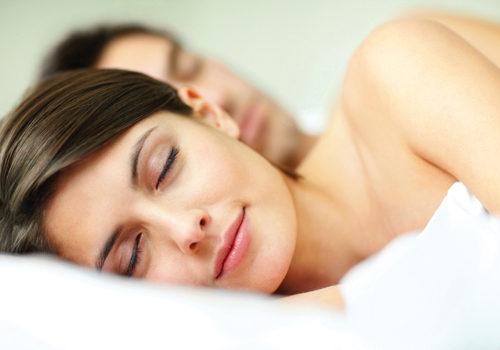The moon has risen, the stars are twinkling and you are settling down for a good night’s sleep. The moment you shut your eyes however, your mind runs wild. Did I pay the bills? Did I turn off the stove? Will I get that promotion? Your heart races. You toss and turn. Finally, after several hours of restless sleep, it is time to wake up again. What should be a pleasant morning turns into a slog.
A good night’s sleep, usually between seven and nine hours, is essential to our mental and physical health (1). Without it, we are less focused in the daytime and are more likely to make mistakes. But what exactly is sleep? All of its functions are not completely understood, but evidence shows it helps regulate immunity and appetite, detoxifies the brain and recharges the body (2).
Two processes occur during sleep: non-rapid eye movement (NREM) and rapid eye movement (REM) (2). NREM lasts as long as 75% of one’s sleep and is composed of four stages. The first stage is a light sleep (2). Stage two is when the actual process of sleep begins to set in. Humans become mentally removed from their surroundings and their body temperature drops (2). The last two stages of NREM sleep are the deepest and most refreshing. Many bodily functions slow down during this time, including our breathing. During these stages of sleep, energy is refreshed, tissues are repaired and important hormones are released (2).
For the remaining 25% of sleep, REM occurs. It usually sets in about 90 minutes after stage one begins (2). The eyes dart back and forth, the muscles turn off and energy is provided to the body and brain (2). If REM is interrupted, it could lead to increased fatigue in the morning.
When Darkness Falls
The whole sleep process is held together by the hormone melatonin. When exposed to light, the suprachiasmatic nucleus (SCN) area of the hypothalamus—a part of the brain that is connected to the retina by a pathway of nerves—sends signals to the parts of the brain that control sleep (3). This is essentially the body’s clock. When the first signs of light are introduced to the body, the SCN raises body temperature and stimulates cortisol production, allowing one to awaken. At the same time, the SCN halts the release of melatonin until it is time to go to sleep.
Melatonin is produced by the pineal gland in the middle section of the brain (3). In darkness, the SCN turns on the pineal gland, thereby releasing melatonin into the bloodstream. For most people, this usually occurs around 9 p.m. Melatonin levels remain elevated until the introduction of light (3). The absence of light is essential to melatonin’s development; melatonin will not be produced easily in a bright room (3).
Stressed Out
More than 40 million Americans suffer from chronic sleep disorders, and another 20 million occasionally have trouble sleeping (4). Many external factors contribute to a sleepless night, not the least of which is stress.
When the body is under stress, it invokes the fight or flight response (5). Stressors trigger the body’s alarm system, which sparks the adrenal glands to release cortisol and adrenaline (5). Adrenaline increases one’s heart rate while cortisol elevates glucose levels in the bloodstream (5). Together, these hormones prepare the body to react to the stressor. Sometimes, these hormones even paralyze the muscles, leading to aches and pains (5). Fight or flight may only take seconds to activate, but for some people, it’s not easy to turn off. Even minor stressors can extend the fight or flight response. When people settle into bed at night, the SCN begins its process, but stress hormones can keep the body awake.
Luckily, one can destress and experience a good night’s rest using natural techniques such as exercising, meditating, deep breathing, eating a healthy diet and consuming certain supplements (6).
Sleep Supplements
First, melatonin is available in supplement form. According to the National Sleep Foundation, supplemental melatonin can help reset the body’s clock and aid in getting a good night’s sleep (3). For this reason, experts say the supplement can help those shifting to a new sleep schedule (like working nights), and the supplement shouldn’t be taken during the day unless one wants to advance the sleep cycle at this time. Some studies indicate that supplemental melatonin can help individuals fall asleep quickly and reduce the number of awakenings, but not necessarily lengthen sleep time.
 Next is valerian, which has a long history of traditional use against anxiety (7). The ancient Greeks and Romans used valerian to treat sleep disorders such as insomnia (7). The National Institute of Health’s Office of Dietary Supplements suggests that there are two main beneficial components of valerian: valerian acids and iridoids. Though they work independently, it is believed that the combination of these compounds contribute to a deep sleep (7).
Next is valerian, which has a long history of traditional use against anxiety (7). The ancient Greeks and Romans used valerian to treat sleep disorders such as insomnia (7). The National Institute of Health’s Office of Dietary Supplements suggests that there are two main beneficial components of valerian: valerian acids and iridoids. Though they work independently, it is believed that the combination of these compounds contribute to a deep sleep (7).
Valerian is also known for increasing the amount of the inhibitory neurotransmitter gamma aminobutyric acid (GABA) available in the brain (7). GABA prevents nerve cells from communicating with each other. When a valerian supplement is ingested, it releases GABA from brain nerve endings and subsequently prohibits it from returning to the nerve cells, allowing the SCN’s sleep process to go on uninterrupted (6). GABA is also available in supplement form to support healthy sleep.
Some studies show that after using valerian for up to 4–6 weeks, individuals may experience an improvement in sleep quality and a reduction in the time it takes them to fall asleep (7). Some valerian supplements also contain herbs such as hops, lavender, skull cap and lemon balm. There is a bit of a debate amongst researchers about whether or not the addition of these herbs is more effective than standalone valerian supplements (7).
5-Hydroxytryptophan (5-HTP), a chemical created from the amino acid tryptophan, is another supplement used to support healthy sleep. Once tryptophan is transformed into 5-HTP, it develops into a neurotransmitter called serotonin, which transmits signals between brain cells. 5-HTP supplements increase serotonin levels in the brain, thereby helping to regulate the natural cycles of our body, including sleep (8).
Ginkgo biloba is an herb traditionally used to support healthy memory and increase circulation to the brain (9). This, in turn, allows the SCN to function properly. Gingko biloba is also used to treat narcolepsy, a dangerous sleep disorder (10). Those who suffer from narcolepsy experience sudden fits of exhaustion. L-glutamine, a key antioxidant in ginkgo biloba, protects brain cells and improves narcolepsy symptoms and overall brain function (10). Proceed with caution when recommending ginkgo biloba supplements to customers. It can produce negative interactions with some prescription medications like antidepressants and blood thinners (10).
Green tea is well known for its many health benefits. L-theanine, a glutamic acid in green tea, restores balance to the body and brain. A study in Japan revealed that L-theanine contributes to a more restful, if not longer, sleep (11). L-theanine also has a positive effect on brain chemistry, resulting in an enhanced mood, which is a recipe for better sleep.
Magnesium also supports calmness and healthy sleep. This “anti-stress” mineral decreases the amount of cortisol released by the brain during stressful situations (12). Low levels of magnesium can increase restlessness and may be linked to insomnia (13). Unfortunately, many people are magnesium deficient due to low amounts of it in our food supply. Therefore, it is best to recommend a magnesium supplement as opposed to foods containing the mineral. WF
References
1. National Institutes of Health, “Information about Sleep,” science.education.nih.gov/supplements/nih3/sleep/guide/info-sleep.htm, accessed Oct. 21, 2013.
2. National Sleep Foundation, “What Happens When You Sleep,” www.sleepfoundation.org/article/how-sleep-works/what-happens-when-you-sleep, accessed Oct. 21, 2013.
3. National Sleep Foundation, “Melatonin and Sleep,” www.sleepfoundation.org/article/sleep-topics/melatonin-and-sleep, accessed Oct. 21, 2013.
4. Anxiety and Depression Association of America, “Sleep Disorders,” www.adaa.org/understanding-anxiety/related-illnesses/sleep-disorders, accessed Oct. 21, 2013.
5. Mayo Clinic, “Stress Management,” www.mayoclinic.com/health/stress/SR00001/NSECTIONGROUP=2, accessed Oct. 21, 2013.
6. WebMD, “Tips to Reduce Stress and Sleep Better,” www.webmd.com/sleep-disorders/guide/tips-reduce-stress, accessed Oct. 21, 2013.
7. Office of Dietary Supplements, “Valerian,” ods.od.nih.gov/factsheets/Valerian-HealthProfessional, accessed Oct. 21, 2013.
8. National Center for Complementary and Alternative Medicine, “Sleep Disorders and CAM: At a Glance,” nccam.nih.gov/health/sleep/ataglance.htm, accessed Oct. 21, 2013.
9. University of Maryland Medical Center, “5-HTP.” www.umm.edu/altmed/articles/5-hydroxytryptophan-000283.htm, accessed Oct. 21, 2013.
10. University of Maryland Medical Center, “Ginkgo Biloba,” www.umm.edu/altmed/articles/ginkgo-biloba-000247.htm, accessed Oct. 21, 2013.
11. “Ginkgo Biloba Natural Remedy for Sleep Disorders,” http://sleepdisorders.dolyan.com/ginkgo-biloba-natural-remedy-for-sleep-disorders, accessed Oct. 21, 2013.
12. T. Mitchell, “Natural Support for Sleep, Mood, and Weight,” Life Extension Magazine, Jan. 2006, www.lef.org/magazine/mag2006/jan2006_report_theanine_01.htm, accessed Oct. 21, 2013.
13. J. Phillips, “How Magnesium Helps You Sleep,” www.nutritionalmagnesium.org/how-magnesium-helps-you-sleep/, accessed Oct. 21, 2013.
Published in WholeFoods Magazine, December 2013









